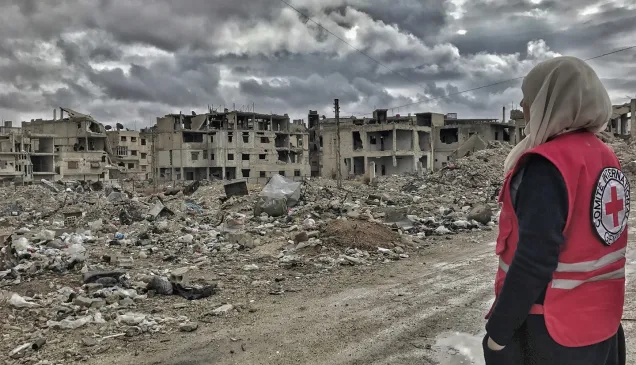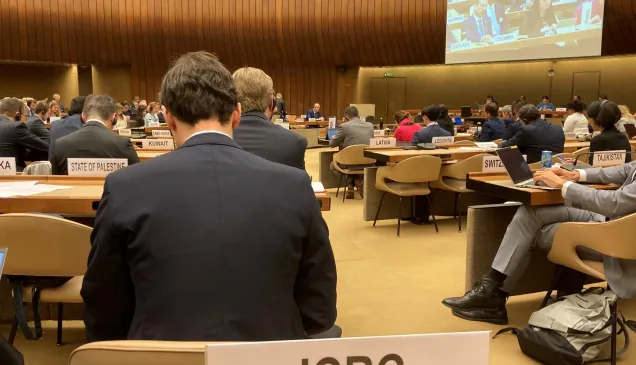Preparatory Committee for the Eighth Review Conference of the States Parties to the Convention on the Prohibition of the Development, Production and Stockpiling of Bacteriological (Biological) and Toxin Weapons and on their Destruction, 8-12 August 2016, Geneva
... it is the overarching obligation of States party to this Convention to protect humanity from the horrors of biological weapons.
Fourteen years ago, alarmed by the potential for hostile use of biotechnology, the International Committee of the Red Cross (ICRC) appealed to governments and military authorities to strengthen their commitment to the prohibition under international humanitarian law against the use of biological weapons, and to work – together with the scientific and medical communities, industry and civil society – to ensure that potentially dangerous biotechnology is subject to effective controls.
With regard to the strengthening of this commitment, significant progress has been made around the world; however, States party to the Biological and Toxin Weapons Convention (BWC) have managed to agree on only limited measures to strengthen the treaty and improve its implementation.
Meanwhile, the pertinent areas of science and technology have been developing apace. The ICRC has long been concerned that scientific and technological advances could make the use of biological weapons cheaper, easier, deadlier and harder to detect, and therefore more attractive to anyone – State, group or individual – who wishes to plan an attack. In late 2015, a report published by the IAP – the global network of science academies – warned that in the past five years alone, technological barriers to developing and using biological weapons had been significantly lowered.
The forthcoming Review Conference of the BWC must therefore take concrete action to reinforce the prohibition against biological weapons. The ICRC would like to draw attention to five issues in particular.
First, States Parties must redouble their efforts to ensure universal adherence to the BWC. The ICRC – which has been making its own efforts to promote universalization with all non-State Parties in advance of the Review Conference – welcomes the news that Angola has become the 175th State Party. The prohibition against the use of biological weapons is part of customary international humanitarian law, and binding on all parties to all armed conflicts. There should be no reason therefore for any State to remain outside the treaty.
Second, those States already party to the BWC must ensure that their domestic laws reflect their international legal obligations. National implementation is critical; and the ICRC's Advisory Service, in Geneva and in the field, remains available to provide advice in this matter.
Third, States Parties should expand efforts to effectively monitor and assess compliance with the BWC. As a first step, the Review Conference should establish a working group – or similar working process – to advance work in this area from 2017 onwards.
Fourth, recognizing that regulation of the use of science and technology is at the very heart of the BWC, and that the risks from biological weapons are linked to widespread and fast-moving scientific developments, States Parties must now act on the need for a more systematic assessment of the implications of developments in science and technology for these risks. The Review Conference should establish an effective mechanism to prioritize topics of interest and to carry out the required scientific assessments; this already has the support of many States.
Fifth, the ICRC welcomes the recent attention by States to strengthening the implementation of Article VII on measures for the provision of assistance in case of the use, or the threat of use, of biological weapons. The ICRC would like to emphasize once again that these efforts must focus on enhancing the capability to assist victims, placing humanitarian needs first and improving the mechanisms necessary to help States achieve this goal.
Lessons have emerged from the international effort to assist people affected by the naturally occurring outbreak of Ebola of 2014 to 2016, many of which may be of use in preparations for a response to the deliberate spread of disease. The ICRC has prepared a short paper that sets out some of the key lessons from its involvement in the Ebola response : Lessons from the naturally occurring Ebola outbreak of 2014-2016
With respect to article VII, the Review Conference should establish a working group – or similar working process – to develop and agree on practical measures to build response capacity where it is lacking, to improve coordination among those who may be involved in a response, to address current obstacles to an effective response, and ultimately to limit the adverse humanitarian consequences of the use of biological weapons.
As the ICRC stressed in its 2002 appeal on Biotechnology, Weapons and Humanity, the life processes at the core of human existence must never be manipulated for hostile ends.
States Parties at the Review Conference in November must reaffirm very clearly the absolute prohibition against biological weapons and the applicability of the prohibition to any use of biological agents, whatever their origin, for hostile purposes.
However, this alone will not be sufficient. Preventing the misuse of biotechnology will require improved, expanded, and collective action at the Review Conference and beyond, including the creation of a working process for 2017 that is empowered to further develop effective measures to contain the dangers of biological weapons to human, animal and plant health.
Responsibility for strengthening the full range of these measures – the 'web of prevention' – is shared by individuals in the political, military, scientific and medical communities, and the biotechnology-related industries. Ultimately, however, it is the overarching obligation of States party to this Convention to protect humanity from the horrors of biological weapons.



